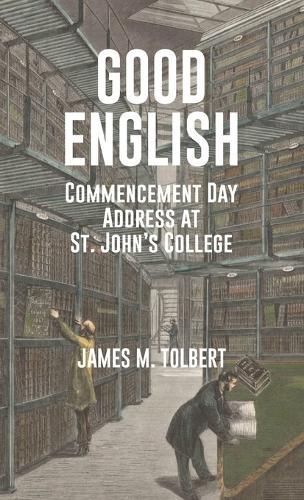Overview
In 1982, St. John's College emeritus tutor Jim Tolbert was chosen to deliver the school's commencement day address. His remarks on that May morning were a master class on the nuances of the English language, the significance of speaking and writing it correctly, and more generally on learning and understanding. Tolbert died in 1993, but his words have been preserved and shared and handed down by the students of that unique, venerable college located near the harbor in Annapolis, Maryland. St. John's is a nationally recognized model for liberal education in large part due to a unique curriculum centered around the Great Books Program. Nonsectarian from the start, the college began as King William's School in 1696 and was chartered as St. John's in 1784, making it the nation's third oldest college. Thomas Jefferson and James Madison were among early supporters. The school's radical unified approach was and is based on the classics of Western thought and literature. Faculty members-called tutors, not professors-conduct seminars, tutorials, and labs through dialogue with small groups of students. There are no majors or electives, and all students follow the same course of study and submit a senior thesis. With a legacy reaching back three centuries and a curriculum that has changed little in nearly a century, the college continues to attract students and educators ""passionate about the life of the mind.""
Full Product Details
Author: James M Tolbert
Publisher: Black Belt Press
Imprint: Black Belt Press
Dimensions:
Width: 10.80cm
, Height: 0.30cm
, Length: 17.80cm
Weight: 0.036kg
ISBN: 9781961938212
ISBN 10: 1961938219
Pages: 40
Publication Date: 15 July 2025
Audience:
General/trade
,
General
Format: Paperback
Publisher's Status: Active
Availability: Available To Order

We have confirmation that this item is in stock with the supplier. It will be ordered in for you and dispatched immediately.
Author Information
St. John's College tutor emeritus James M. Tolbert was a native of Columbus, Georgia, who held undergraduate and master's degrees from Emory University and a doctorate in English from the University of Texas. During World War II, he served in counterintelligence in the Philippines and afterwards in Japan, and also in security at the Manhattan Project in Los Alamos, New Mexico. He taught at and chaired the English Department in Florence, Alabama, at what is now the University of North Alabama before joining the St. John's faculty in Annapolis, Maryland, in 1953. He was initially both a tutor and director of admissions before becoming a full-time tutor from 1972 until his retirement in 1979; he died in 1993. He was a beloved and esteemed figure on campus, a courtly and gentle Southerner who shepherded a generation of students into St. John's.



